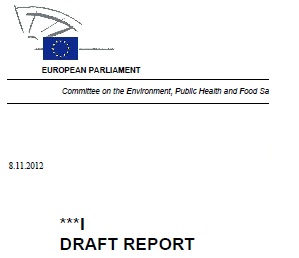 EU withdrawal from International Obligations Illegal, says legal expert
EU withdrawal from International Obligations Illegal, says legal expert
Brussels, 19 November 2012 – The draft report prepared by rapporteur MEP Carl Schlyter on the European Commission proposal for a ship recycling regulation[1] received failing marks from a global coalition of environmental and human rights organisations – the NGO Shipbreaking Platform – for agreeing to unilaterally remove European ships from the Waste Shipment Regulation and therefore allowing them to be dumped in developing countries.
While the Platform welcomed Green Party member Mr. Schlyter’s improvements over the weaker European Commission proposal for managing the recycling of the European fleet of merchant ships[2], the Platform expressed surprise and dismay in his willingness to undermine the Basel Convention instead of strengthening its enforcement. The Convention is an international agreement championed by Europe to prevent developing countries from being used as dumping grounds for toxic waste.
“It is shocking to us to see some of the Greens of Europe turning a dreadful shade of gray. The ban on exporting hazardous waste has been a seminal landmark decision for Europe’s environmental community since 1994, ” said Jim Puckett, director of the Basel Action Network (BAN). “This proposal is a sad re-endorsement of an obsolete ‘Polluter need not Pay’ principle, an incomprehensible retreat for the Greens from legally established norms of environmental justice.”
Such a move, if accepted, would also be a clear legal violation by the EU and its member States according to EU environmental jurist, Dr. Ludwig Krämer. In a legal analysis[3] released today, Dr. Krämer concludes that “any proposal to remove ships from the Waste Shipment Regulation is in breach of EU and EU Member State’s legal obligations under the Basel Convention.“
Ships need not leave OECD
According to the NGO Shipbreaking Platform’s recent report[4], there is plenty of green ship recycling capacity in the OECD group of developed countries, leaving no excuse to the EU to alter its policy and send toxic wastes to developing countries. Even in China, where beaching of end-of-life ships is prohibited, legitimate trade unions are outlawed and appropriate downstream management of hazardous residual waste can be sub-standard. Moreover, the Platform argues that by holding and actually enforcing the principles of the Basel Convention, the EU is given an excellent opportunity to create many new jobs in its existing ship recycling facilities and to activate large dormant capacities.
In this sense, the Platform praises Rapporteur Carl Schlyter’s draft report for proposing an economic instrument such as a ship life insurance or an environmental port fee to ensure funds are set aside during the life cycle of ships plying European waters for proper ship recycling at end- of-life. A financial mechanism is the only way to prevent shipowners from reflagging ships at end-of-life and avoiding European regulation.
The Platform is also pleased to see that the draft report calls for an end to “beaching” operations and seeks to implement the “substitution principle” to ensure the least harmful materials and chemicals are used in shipbuilding.
“We can manage European ships in both a principled and practical way, ” said the NGO Shipbreaking Platform’s Executive Director, Patrizia Heidegger. “We call on the European Parliament to work with MEP Schlyter to align the Commission proposal with established international policy and law by ending the movement of hazardous ships to non-OECD countries, while promoting green jobs in clean and safe ship recycling in Europe.”
Notes: [1] Draft report by Carl Schlyter MEP on the European Commission Proposal for a ship recycling regulation available here: http://bit.ly/Q4OEbk [2] European Commission Proposal for a ship recycling regulation COM(2012)118 available here: http://bit.ly/Pz8ANd [3] Ludwig Kraemer’s legal analysis (and a 3-page summary) is available here: http://bit.ly/TTf3H6 [4] Report on OECD capacity in US, Canada and Mexico by Basel Action Network available here: http://bit.ly/T6wOSJ [5] NGO Shipbreaking Platform and Greenpeace EU joint position paper on the European Commission Proposal for a ship recycling regulation available here: http://bit.ly/TGKbKi





